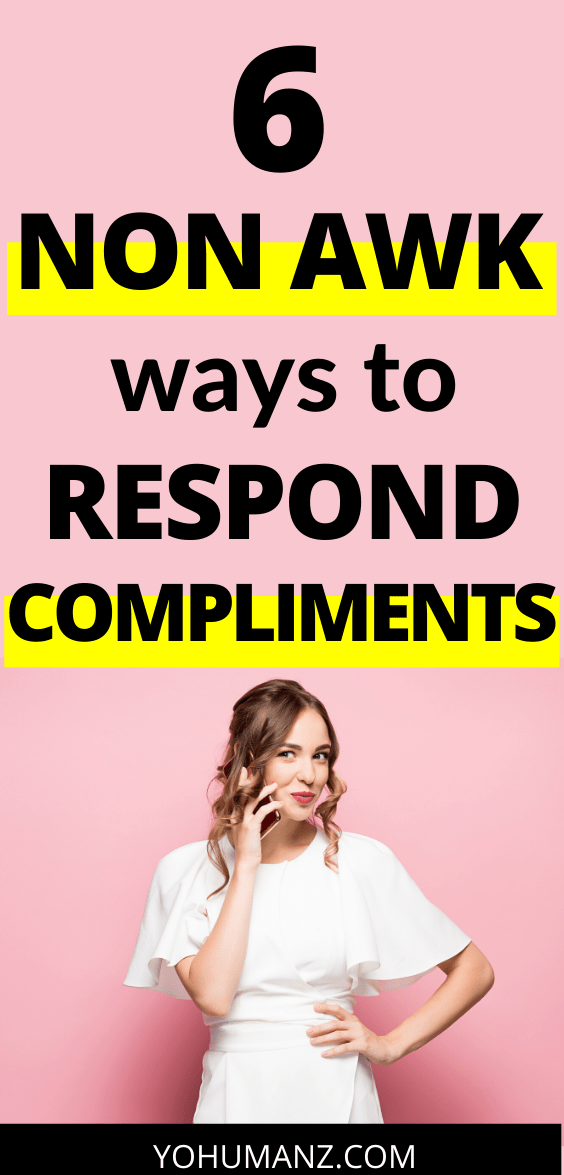Table of Contents
Compliments are weird, right?
They usually feel good to get (even if we’re too modest to admit it).
But often they feel awkward to respond to.
Like, is saying “thanks” confirming the compliment you’re self-conscious is screaming “no” to?
…But not saying “thanks” is also rude.
So what do you do?
Here, we’re showing you how to answer a compliment in 6 ways, complete with examples.
Factors that Influence How to Answer a Compliment
If you give dozen people the same compliment, how they respond will each be slightly different. That’s because there’s some personal factors that influence how we perceive them. If you’re wondering how to answer a compliment, it’s worth consider the factors below, where you currently fall into them and how that affects your response.
Imposter Syndrome
Have you heard of Imposter Syndrome? It’s the when someone continuously doubts their skills and has an fear of being “found out” as a “fraud.” For example, someone compliments your work and you doubt you have the skills and if you do, then it’s probably a one-off success. If someone genuinely says you’re beautiful, you doubt that and fear them finding out what you really look like when you wake up.
In other words, imposter syndrome holds us back from seeing who we truly are, even when others can see our skills or talents. If we believe this about ourselves, it can make it difficult to accept compliments because we don’t believe them. Saying “thank you” genuinely feels weird because the compliment was weird in the first place—after all, we aren’t that great or deserving of it.
The first step to accepting a compliment is killing imposter syndrome—even if you can just manage it for the moment.
Self-confidence
Along with imposter syndrome, someone can also suffer from low self-confidence. While imposter syndrome can affect specific areas of skill or talent, you might lack confidence overall. In this case, you may think that any compliment you get is weird and out of place.
If you can relate to this, understand that you likely respond to compliments from this angle. Recall ways you’ve downplayed comments because you don’t see yourself as deserving. Then try to accept that someone else truly sees that about you.
Modesty
Perhaps you know your skills and your positives, but you’re also big on modesty. You’re afraid of coming across as too braggy or showy. So instead of accepting a compliment, you downplay it, saying it’s not true or all that important.
The most popular example of this is compliment someone’s outfit and they respond with, “Oh, this old thing?” Even though they may think they look great in the dress, they don’t want others to know they know because that would be immodest of them.
The truth is that saying “thank you” isn’t being immodest. It isn’t even complimenting yourself. In fact, I’d argue that accepting a compliment is modest because you’re humble enough to accept someone else’s opinion, even if it makes you uncomfortable to voice.
Cockiness
Cocky people respond to compliments often in inappropriate ways, as if they’re all-knowing about how great they are. When looking for how to answer a compliment, this isn’t a good way. But we won’t go on about it because chances are, if you’re reading about how to accept one, you aren’t cocky.
Compliment Genuine-ness
Lastly but importantly, how we respond to compliments has a lot to do with how genuine the compliment is. If we feel the person is coming from a good place and means it, we want to give a genuine thanks back. If the person said it rudely, to get something from us or as a backhanded comment, we usually aren’t sure what to say—but it definitely didn’t make us happy.
Disingenuine compliments may include:
- A guy yelling out his car window with his gross friends, “You’re so sexy!”
- A guy who you just met at the bar telling you that you’re wifey material and he’d love to take you back home because you’re just so smart
- An aunt who always insults your hair, but compliment now that you’ve dyed it back to a “normal” color
In any of these cases, you don’t have to accept the compliment. You can walk away, say it made you uncomfortable or ignore it completely.
How to Answer a Compliment: 6 Tricks

If you’re someone who’s not always sure of themselves, it can be difficult learning how to respond to a compliment in a polite, non-awkward way. Here’s some ideas you can practice.
#1 Say Thank You
The easiest way to answer a compliment is just to say thank you. Often times, we are too busy defending why we don’t deserve a compliment. But try to put that out of your mind for a moment and just accept that someone else thinks you deserve it. It feels nice right?
It’s not always easy to give compliments and nobody needs to, so when somebody genuinely chooses to, say thanks!
Remember that there needs to be no qualifier or prologue to it. Don’t say:
- “It really looks bad, but thanks.”
- “Thanks, but I really didn’t do much.”
- “I really don’t think so, but thanks anyway.”
Thank you is a complete sentence 🙂
If “thanks” seems to short or dismissive, say it out fully. For example, my go-to is always “Thank you so much, I really appreciate it.”
#2 Give Praise for Complimenting
When someone gives you a good or heartfelt compliment, you may want to go beyond the plan “thanks” and elaborate a little.
For example, if I feel like someone I don’t know went out of their way to give me a nice compliment, I’ll say thanks, but I’ll also add something like, “you are so sweet!”
Other variations could include:
- “You’re so nice for saying that.”
- “You’re so kind for going out of your way to say that.”
- “What a nice thing to say!”
Giving people praise for saying something nice is almost like giving them a compliment back. It makes them feel better and they’ll probably like you even more too! Everyone likes feeling like they’re being a good person.
#3 Share Relevant Information
Above we said that thank you is a complete sentence. And it is. But sometimes being short saying thank you can feel awkward. We feel the need to elaborate. Which is probably why we end up self-deprecating in most compliment responses. Instead of doing that though, think about what else you can add to your “thank you.”
The most common example is someone complimenting your shirt and saying, “Thanks! I got it from the store down the road.”
Other options can include:
- Sharing where you got a product relevant to the compliment (ex. shirt, décor)
- Sharing where you got a service relevant to the compliment (ex. hair, car detailing)
- Sharing how you did something (ex. workout regime to get fit)
- Sharing the recipe for something (ex. if you got complimented on your baking)
#4 Share Impact of Compliment
Let’s face it, it can be awkward to receive a compliment, but if it’s genuine, it usually also feels good. Maybe you weren’t expecting it, maybe your day was going bad, maybe you feel better about yourself because of it. The point? Compliments have impact. Telling people that ensures they will go on to compliment more people and the world will be a happier place because of it.
Also, the person who complimented you will feel the love back. Realizing they made you feel good will likely make them feel good. So don’t be afraid to share the impact your comment had. Examples could include:
- “It really means a lot to me.”
- “You just made my day.”
- “Nobody ever says that to me!”
- “I was worried red didn’t look good on me, but now I feel a lot better.”
- “I have to say, I’ve been having a horrible week and just saying that small thing really lifted me up.”
- “You don’t know how your compliments will lift someone’s day!”
#5 Ask a Relevant Question
When thank you seems too short and awkward to say, another way you can lengthen the conversation is by asking a question. This also takes the attention away from you, which is useful if being the center of attention makes you uncomfortable.
Think about questions relevant to the compliment. Of course, this will depend on the thing you’re being complimented about. Here’s a few examples:
- Compliment about hair –>Where do you get your hair done?
- Compliment about your work –>What part was your favorite/most meaningful?
- Compliment about your decor –>What artwork/other pieces would look nice with it?
- Compliment about your earrings –>Do you know where I can get a cheap sterling silver pair?
#6 Compliment Back
The last way to accept a compliment is to compliment the person back. Of course, you want to accept and acknowledge their compliment first. Don’t immediately fire a compliment back as a way of rejecting your own.
The most common example is saying “you too!” Like, if someone says they like your hair color and you say, “Thanks, I love your hair too!”
To make the most out of it though, try to make it a specific and genuine compliment. For example, firing back the exact same line could seem fake or that you’re just looking for something to say back. Adding more detail makes the compliment more special to the person. For example, “Thanks, I love your hair too, I wish I could pull off red like you” or “Thanks, your haircut really suits your face shape, it looks great!”
Summary on How to Answer a Compliment
Getting compliments can be awkward, even if it feels good. Yet, we want to honor the fact that someone took the time to tell us something nice. So, how do we do it without coming off cocky or like we have no confidence at all?
The tips shared in this post should help you accept compliments without insulting yourself in the process. If “thank you” seems short and you’re wondering how to answer a compliment, we’ve provided other ways you can add to your response.




